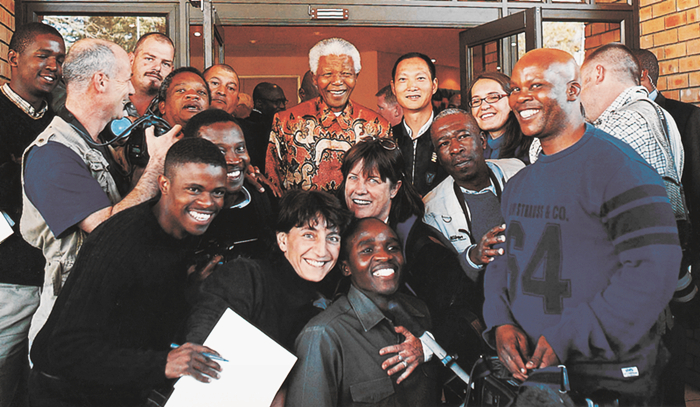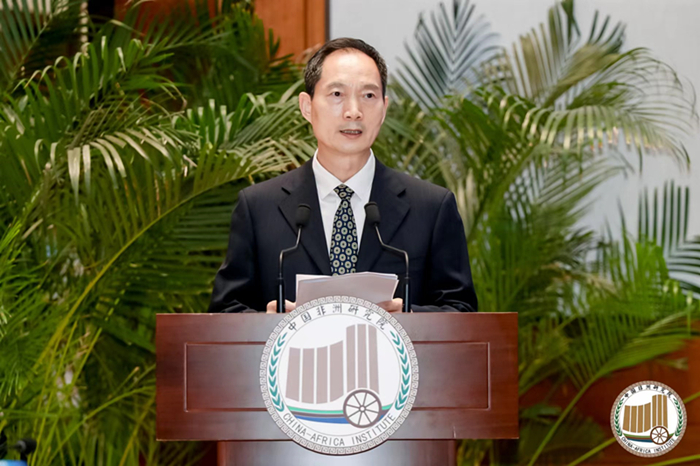|
||||||||||
| Home Nation World Business Opinion Lifestyle ChinAfrica Multimedia Columnists Documents Special Reports |
|
||||||||||
| Home Nation World Business Opinion Lifestyle ChinAfrica Multimedia Columnists Documents Special Reports |
| ChinAfrica |
| A Historic Mission |
| A scholar devotes himself to opening a new window for Chinese people to know the real Africa |
| By Xia Yuanyuan 丨VOL. 14 September 2022 ·2022-08-29 |

Li Xinfeng and African journalists pose before camera with former South African President Nelson Mandela on June 1, 2004, in Johannesburg, South Africa
Back in 1405, a huge fleet consisting of 208 ships set sail in the ocean. The commander of this fleet was Zheng He, a famous Chinese admiral. Carrying porcelain, silk, tea and other numerous treasures from China, the fleet passed through the South China Sea and the Strait of Malacca, traversed the Indian Ocean and docked in many countries along the way.
Over the next 28 years, Zheng led his fleets along the route for another six times and landed on the African continent four times, visiting many countries along the East African coast, and opening channels for official exchanges between China and Africa.
However, looking back at the research in the past century, there are few studies dealing with this history. Li Xinfeng, a writer and Executive President and Senior Research Fellow of the China-Africa Institute, filled this gap in the research on the history of Sino-African relations.
When serving as the chief correspondent with the People’s Daily in South Africa from 1998 to 2005, Li followed the traces left by the famed navigator and traveled around much of the southern part of the African continent, searching for signs of Zheng’s fleet that had been there some six centuries earlier. The result is a compelling story in the form of the book A Reporter’s Exploration: Following Zheng He’s Footsteps in Africa, which is the first book on Zheng’s voyage to Africa in China.
Now as a scholar studying Africa, his academic research and published works have recorded China-Africa relations and actively pushed forward people-to-people ties and cultural exchanges between China and Africa.
A record of exchanges
Li described himself as a person with the spirit of exploration. In 1999, when he was a journalist in South Africa, he read a news report that some descendants of the sailors of Zheng’s fleet still lived in the Pate Island in Kenya.
“I was excited when I read the news. I thought we should find out the truth,” Li told ChinAfrica.
To do research for this story, he visited Pate Island four times alone, and traveled around much of the southern part of the African continent to look for traces of Zheng’s fleet and the origin of China-Africa connection.
In eight years, Li accumulated a large amount of original materials through his field visits. “I observed that even after over 600 years - almost 20 generations - the legacy of Chinese traditional culture is still there. The intangible force of culture, so subtle yet strong, has influenced people and society imperceptibly,” Li said.
During the eight years, he published a lot of stories on his exploration, which had great impact on Chinese and foreign readers. In 2005, the book A Reporter’s Exploration: Following Zheng He’s Footsteps in Africa was published. Lu Ting’en, Honorary President of the Chinese Society of African Historical Studies, said that the book is China’s first work of investigation and research on Zheng’s voyages to Africa, which systematically describes the whereabouts of his fleet in Africa and the relics and influences it left behind, filling a gap in the literature on Chinese history.
Li believes that Zheng was an important symbol of the Chinese people in conducting cultural exchanges with the rest of the world.
Presenting a real Africa
“Although Sino-African exchanges happened much earlier than European-African contact, we didn’t have much direct communication during a period of 600 years. We got to know each other mainly through the West,” Li said. As the third party, the message the West sent sometimes inevitably involved its own viewpoints. China’s understanding about Africa is still not complete and comprehensive.
“I think the best way to understand Africa is to go there and talk with the local people. My eight years there have changed my previous imagination of Africa and my views on some issues,” he said. “I hope I opened a window for Chinese people to know a real Africa.”

Li Xinfeng chairs the 11th Meeting of the China-Africa Think Tanks Forum in Beijing on July 20
Li believes that to give Chinese readers a real and full picture of Africa, correspondents should observe Africa through their own eyes, speak to local Africans and experience the African lifestyle.
During the eight years, Li traveled across the continent and visited over 20 African countries. To gain a more accurate understanding of Africa, he traveled to other places within each country outside its capital city. “Normally, the capital city is relatively developed, and only visiting the capital makes your understanding of a country one-sided,” he told ChinAfrica. To better understand a country, one needs to visit not only its cities, but also its rural areas; one needs to pay attention to the daily life of ordinary people, he added.
Studying Africa
Upon returning to China, Li decided to change his career, and became a scholar studying Africa. “I am a very focused person. I have accumulated a lot of materials in Africa during the eight years, and I don’t want to waste these materials and my personal experience in Africa. Being a scholar allows me to concentrate on research, and I hope to present these materials to Chinese readers,” he said.
In 2008, Li started to work in the Chinese Academy of Social Sciences to specialize in African studies. He published a number of works including Zheng He and Africa and Darfur Issue under the Global Perspective, which expands the depth and breadth of Chinese studies on Africa.
Currently, Li is executive president and senior research fellow at the China-Africa Institute. Established on April 9, 2019, the institute aims to play a positive role in strengthening cultural, policy and people-to-people links between China and Africa.
In the past three years, the institute has promoted think tank exchanges. To make scholarly exchanges more targeted and pragmatic, the institute established 50 China-Africa joint research projects in 2019, which attracted the active participation of experts and scholars from both China and African countries. The topics cover ecological protection, industrial development, enterprise governance, poverty reduction, youth development, smart transportation and so on.
“Zheng’s voyages to East Africa amounted to a peace journey and promoted cultural exchanges between China and Africa. China-Africa relations are deeply rooted, and have been friendly from generation to generation,” Li said.
“Now, China and Africa are building a closer China-Africa community with a shared future on the basis of the high-quality development of the Belt and Road Initiative. China-Africa relations are in the best period in history, and China-Africa cooperation is bringing tangible benefits to the Chinese and African people,” he said.
In the future, non-governmental exchanges between China and Africa should further expand people-to-people and cultural exchanges, so that China-Africa relations can continue to go deeper and deeper, he added.
|
||||||||
| About Us | Contact Us | Advertise with Us | Subscribe |
| Copyright Beijing Review All rights reserved 京ICP备08005356号-5 京公网安备110102005860号 |